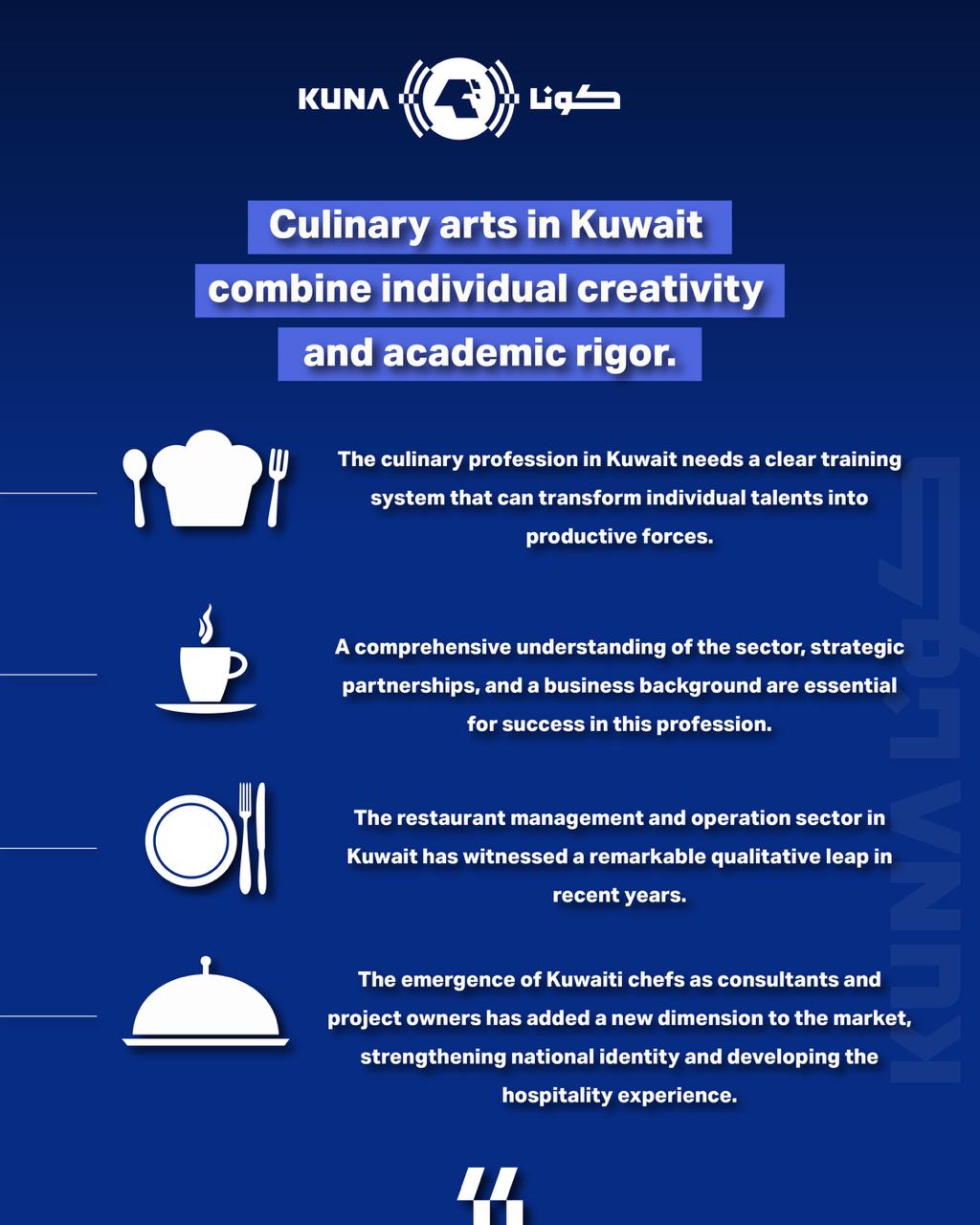LOC11:31
08:31 GMT

Feature by Khaled Al-Jalis
KUWAIT, Nov 24 (KUNA) -- Culinary arts in Kuwait are no longer a hobby practiced at home, they have become an established profession, combining individual creativity with academic rigor, and opening new horizons for Kuwaiti youth towards comprehensive career paths.
Kuwaiti cuisine, once confined to recipes passed down through generations, is now making its way onto the global stage thanks to the efforts of Kuwaiti chefs who have blended local traditions with modern cooking techniques. As part of their national identity, diverse success stories have emerged from Kuwait, placing it on the map of professional cuisine.
Chef Faisal Al-Nashmi, a co-founder of a restaurant management company, told KUNA that he has been working for years to develop local food brands, explaining that his role extends beyond traditional cooking to include overseeing operations and development to ensure the quality of the final product.
He emphasized that the culinary profession in Kuwait needs a clear training system that can transform individual talents into productive forces, that the biggest challenge facing Kuwaiti chefs today is the lack of institutional guidance, and the existence of an official body or specialized association to support chefs would be a major turning point for the profession.
Al-Nashmi pointed out that talent alone is incomplete without a comprehensive understanding of the sector, strategic partnerships and a business background are essential for success in this profession. He noted that Kuwaiti cuisine possesses a richness that qualifies it to be a global competitor if presented correctly.
In a similar statement to KUNA, Chef Sheikha Al-Mohammad explained that her experience working at the Kuwait Aviation Services Company (KASCO) as a development chef presented a unique challenge, given that cooking for aviation involves precise conditions related to changes in taste and flavor at high altitudes, which requires in-depth scientific knowledge in addition to practical experience.
She indicated that registering her name as the first Kuwaiti development chef with the Civil Service Commission (CSC) was a positive step for the culinary profession in Kuwait, considering this step an official recognition of Kuwaiti chefs, one that opens the door for the profession to be recognized professionally and academically.
Chef Sadiqah Esmaeil told KUNA that her culinary journey began in her childhood, she later traveled abroad to study at prestigious academies such as Le Cordon Bleu in London and Ferondi in Paris, adding that this academic training broadened her perspective and instilled technical skills, precision, and creativity in her, enabling her to return to Kuwaiti cuisine and present it in a contemporary style while preserving its authentic taste and flavor.
She explained that she presented Kuwaiti cuisine in the style of fine dining and created recipes that combined international and local flavors, such as French macarons with Kuwaiti flavors, Zubaidi fish fillet with herb and saffron sauce, Khathra with lime caviar, and Trifle Sub Al-Qafsha, to convey the message that the flavor of Kuwaiti cuisine is capable of competing in the finest international restaurants.
For his part, Fahad Al-Arbash Chairman of the Kuwaiti Restaurants, Cafes, and Catering Services Federation told KUNA that the restaurant management and operation sector in Kuwait has witnessed a remarkable qualitative leap in recent years, the entry of Kuwaiti chefs as consultants and project owners has added a new dimension to the market by strengthening Kuwaiti identity and developing the hospitality experience.
He explained that projects managed or owned by Kuwaiti chefs have been met with widespread demand and outstanding success, some of whom have achieved international recognition through their participation in events and projects outside Kuwait.
Al-Arbash added that the Federation is working to enhance employee efficiency and organize specialized workshops in establishing professional and operational standards that align with global health and safety requirements, to transform Kuwait into a leading center for hospitality and innovative cuisine in the region.
Kuwaiti chefs share the view that it is still too early to establish cooking as an academic and professional field, but, however, it provides many opportunities for generations to come since it has become related to educational bodies and professional legislation capable of making a breakthrough in this regard.
With Kuwaiti chefs maintaining their individual and collective experiences, a clear-cut message remains that cooking has become a message of expressing identity and promoting Kuwait's status in the global cultural and economic scene. (end)
kja.res